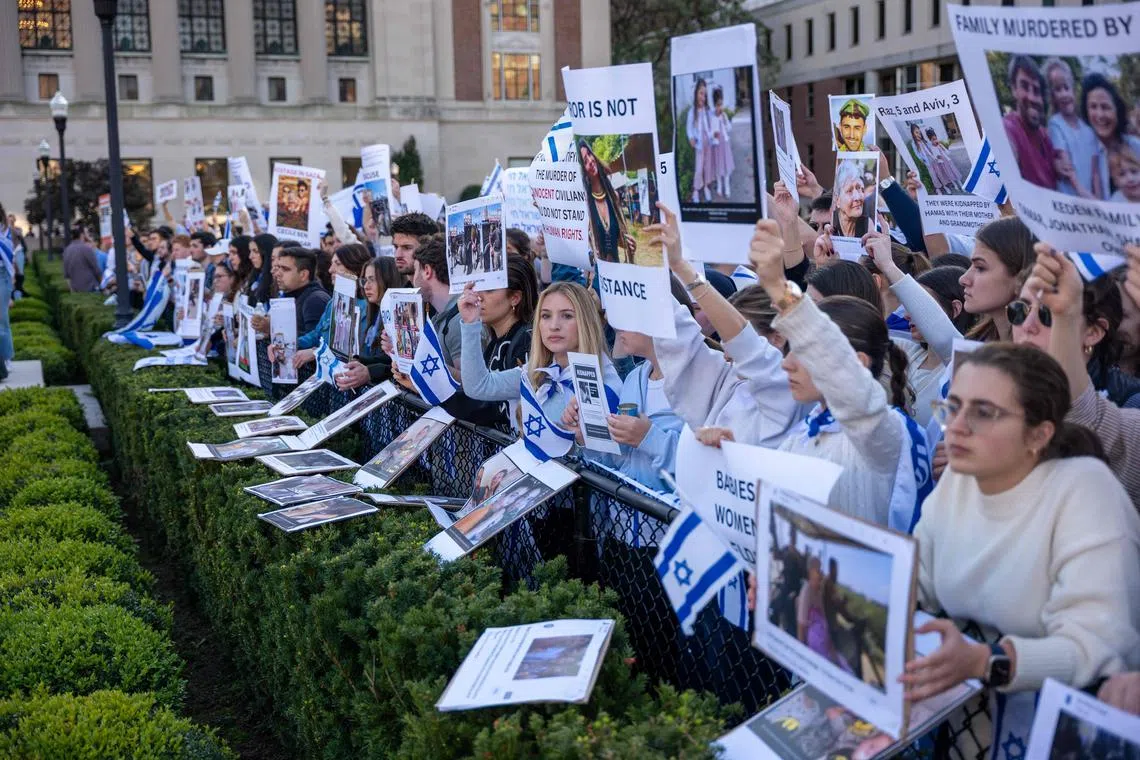US House Republicans grill university presidents over campus anti-Semitism
Sign up now: Get ST's newsletters delivered to your inbox

Columbia students participating in a rally and vigil in support of Israel on Oct 12.
PHOTO: AFP
Follow topic:
WASHINGTON – United States House Republicans on Dec 5 pressed the presidents of three of the country’s most prestigious universities on their efforts to combat anti-Semitism following the Oct 7 attack by Hamas on Israel, with some suggesting their response to rhetoric that surfaced on campus was inadequate.
In their testimony before a US House of Representatives committee, Ms Claudine Gay of Harvard University, Ms Liz Magill of the University of Pennsylvania and Ms Sally Kornbluth of Massachusetts Institute of Technology each denounced the Islamist militant group’s attack and affirmed their commitment to assuring Jewish students feel safe.
At the same time, all three reiterated a promise to protect free speech on their campuses.
“We do not sanction individuals for their political views or their speech, but when that speech crosses into conduct that violates our behaviour-based policy – bullying, harassment and intimidation – we take action,” Ms Gay said.
The university presidents are at the forefront of the latest battle over free speech on US college campuses.
Many have been roiled by clashing pro-Palestinian and pro-Israel demonstrations that have sometimes given way to anti-Semitic and Islamophobic rhetoric and assaults.
Harvard and Penn in particular have faced backlash from prominent Jewish alumni and donors over what critics say have been slow or inadequate responses from the administrations denouncing behaviour these critics consider anti-Semitic.
“People deserve answers, not rhetoric,” said Republican Representative Lisa McClain of Michigan.
“It is clear that the Jewish students on all of your campuses are afraid to be themselves because you refuse to take real action… against anti-Semitism.”
At the University of Pennsylvania, a Palestinian Writers festival in September, which featured some outspoken pro-Palestinian speakers described as anti-Semitic by critics, prompted outrage at the time. That anger intensified after the Oct 7 attack.
At Harvard, more than 30 student groups signed a letter blaming Israel for the violence that consumed the region following Oct 7, prompting some donors to pull their support from the school.
On Dec 5, House Republicans, including Representative Elise Stefanik of New York, pressed the presidents on those incidents.
Representative Kevin Kiley, a Republican from California, asked Ms Gay – who waited days before speaking out to distance the school from the statement signed by dozens of Harvard student groups – whether she had any regrets about her response.
Ms Gay said if she knew the statement would be wrongly attributed to the university, not just to the student groups, she would have spoken out sooner.
Committee members pushed Ms Magill on whether in retrospect Penn should have hosted the Palestinian Writers festival, with some accusing her of permitting anti-Semitism on campus even as she swore to defeat it.
“You create a safe haven for this type of anti-Semitic behavior,” Representative Jim Banks, a Republican, told Ms Magill.
Ms Magill said she personally opposed the anti-Semitic views of some speakers at the festival, but that she did not consider cancelling the event.
“We have probably thousands of speakers to campus every single year. Many of them I disagree with. I don’t cancel or censor them in advance of their arrival to campus,” Ms Magill said. REUTERS

